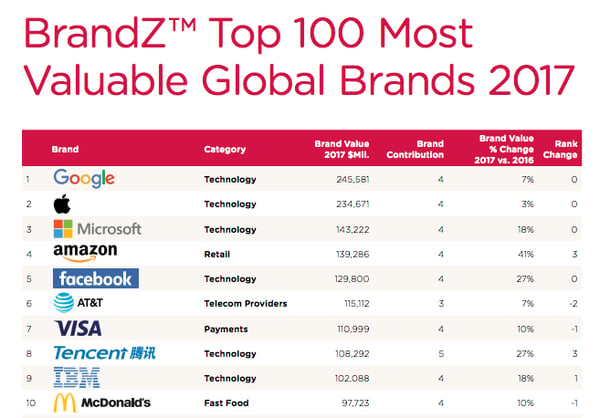AMAZON VAT SERVICES LAUNCHES FOR BRANDS SELLING IN THE EU
Amazon launched a new service with this title, which helps sellers expanding in EU markets to meet their VAT compliance obligations outside of their home country. The service is available to UK- and EU-based sellers to register, report, and other administration for Amazon markets in France, Germany, Italy, Poland, Spain, Czech Republic and the UK.
This resolves a major pain point for brands wanting to expand to new markets but are daunted by the upfront registration and monthly reporting reporting
At 400 euros per country per year, it’s a great deal if you’re using Pan-European FBA. Amazon graciously recognizes that sellers are likely selling on other non-Amazon channels too, so offer an additional 10 Euro fee for off-Amazon channels.
AMAZON CROWNED ONE OF THE WORLD’S TOP 5 MOST VALUABLE BRANDS
Google, Apple, Microsoft, Amazon, and Facebook took the top five places in the 2017 BrandZ Top 100 Most Valuable Global Brands ranking. Its brand value of $139.3 billion was more than double that of Alibaba. This ranking is now in its 12th year, and its methodology includes interviews with three million consumers as well as analysis of financial and business performance.

IT’S A LONG WAY TO THE TOP (BUT ITS STABLE ONCE YOU’RE THERE)
Analysis from Marketplace Pulse finds a very low churn rate in the top Marketplace Sellers (those with the largest sales volume) on Amazon. Despite incredible growth in the number of new sellers on Amazon each month, this study shows that the volume of new sellers entering the marketplace doesn’t seem to affect the top sellers.
AMAZON’S CUSTOM BRAND PROTECTION DEAL WITH NIKE
A great piece discussing the Amazon-Nike deal came out on econsultancy.com. For years, Nike refused to sell its products directly on Amazon, believing that selling on Amazon would lead to a loss of control over its brand and pricing on the platform. But as brick and mortar chains go out of business, and competitors like Adidas took to selling on Amazon themselves, Nike took another look at Amazon.
The result is interesting--it's a custom deal which has Amazon itself taking accountability for protecting the Nike brand on its platform. Brands usually have no choice but to take responsibility for detecting unauthorized changes to their product pages, detecting and taking action against counterfeit sellers, and handling other brand protection services (which we spend a lot of time doing for our clients at Bobsled Marketing).
Both sides seem to have conceded a lot in this deal: Nike finally concluded that Amazon is a channel it can no longer ignore; Amazon finally agreed to play an enforcement role within its own marketplace. It will be interesting to see how this unfolds, and whether Amazon can use similar terms to lure back other major brands that've been disenchanted with the lack of brand control on Amazon.
AMAZON WINE FINALLY ON THE WAY
Despite being launched in 2012, Amazon Wine has finally struck a deal with a winemaker to produce wine under its “Next” private label brand.
The three varieties of wine have apparently been personally approved by Amazon CEO and founder Jeff Bezos. The price points are interesting. Each bottle is set to cost between $20 and $40, which is a bit uncharacteristic of Amazon, which almost always goes for value for its own brands.
A NEW ESTIMATE ON THE NUMBER OF MARKETPLACE (3P) SELLERS
Some more analysis from Marketplace Pulse estimates that there are 4-5 million Amazon marketplace (3rd party) sellers. Amazon hasn’t confirmed the number of sellers since 2015, so this analysis is based on Marketplace Pulse’s own data sources and some interesting calculus.
As the article concludes, “as far as most sellers are concerned it doesn't matter who are the millions of other sellers. Their competition is in hundreds of thousands of sellers at best, likely much smaller. Like most markets, the sellers are distributed in a hockey-stick distribution - 80% of sales are generated by 20% of top sellers.”
ALIBABA PLAYS MATCHMAKER TO U.S. BRANDS & CHINESE CONSUMERS
Chinese retail giant Alibaba launched the ‘Taobao Global US Merchants Network’, which matches U.S. manufacturers with distributors who are already selling on the TMall and Taobao channels in China. This solution recognizes the steep regulatory, logistical, and cultural challenges that U.S. brands face when trying to export to the huge Chinese market.
Alibaba has more than half a billion consumers on their platforms, and started officially courting U.S. brands earlier this year with a big event in Detroit focused on how brands can access this enormous and growing consumer market.
.png)
